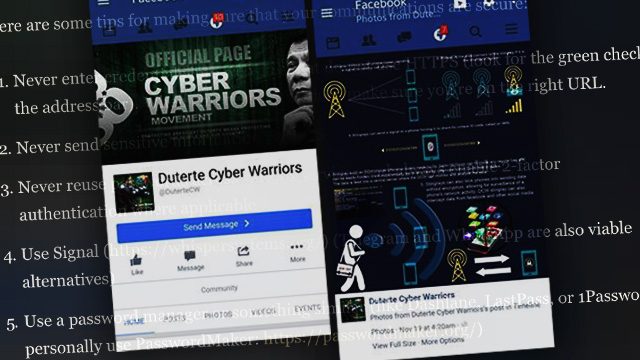SUMMARY
This is AI generated summarization, which may have errors. For context, always refer to the full article.

MANILA, Philippines – Has your Facebook account been recently compromised?
A post by Facebook user Pepe Bawagan – a UP Diliman graduate with a degree in computer science – says there are many people who had recently been locked out of their Facebook accounts – potentially the result of someone trying to lockpick their way into one’s account.
In Bawagan’s post, he speculates that the recent spate of lockouts could have been caused by an alleged cyber-offensive by the pro-Duterte group called Duterte Cyber Warriors (DCW) – although he himself doubts it.
The group, according to the photos Bawagan screengrabbed from DCW, is plotting to do surveillance on people who they claim are manipulating the youth’s minds to go on rallies opposing Martial Law and the burial last week of former president Ferdinand Marcos.
The group contends that the youth should not concern themselves with Martial Law, which is faulty reasoning because events in the past have a ripple effect on the present or the future.
The Marcos dictatorship is a massive turning point in Philippine history, and continues to affect everyone, the youth included. As any Filipino citizen, they have the right to know, and the right to act on that knowledge, whichever way they see fit. (Read: Were it not for Marcos, Filipinos today would have been richer)
The DCW mobile offensive tool
With the “DCW mobile offensive tool,” DCWs are planning to disrupt the communications of those who are opposed to them. The tool is said to be made up of components obtainable at online retailer Lazada.com.ph for a cost of P5,000.
The tool is said to be able to intercept Wi-Fi and cellphone traffic within 20 to 35 feet – the end-goal of which is to steal data. The group also made a call-out for “field operatives” who would activate these devices in certain locations like Makati.
The plan is for the field operatives to collect the data at the physical locations, then relay them to someone higher up in the chain.
The plan is part of the group’s “Oplan Cyber Tokhang,” a reference to the administration’s anti-drug war called “Oplan TokHang.”
Bawagan said the “devices are designed to intercept mobile communications.”
But he wasn’t convinced that the tools would be effective: “However, mobile communications that have been end-to-end secured (e.g., websites using HTTPS) can be intercepted but will not be understandable to the attacker. For example, if you log into Facebook via your phone, any people intercepting your communications will not see your username and password as they are encrypted.”
He gives other reasons as to why the Facebook lockouts are happening.
“For one thing, if you reuse your passwords across various services, you might be at serious risk. Here is a convenient website that can inform you if your account has been compromised previously: https://haveibeenpwned.com/“
He also speculates that Facebook is facing massive cyberattacks right now from other parties.
Whatever the exact cause may be, Bawagan provided 5 tips to make your communications more secure. Here they are as they appeared in his post:
- Never enter credentials into websites that do not use HTTPS (look for the green check in the address bar). When entering credentials, make sure you’re on the right URL.
- Never send sensitive information via SMS.
- Never reuse passwords across various services and always enable 2-factor authentication where applicable.
- Use Signal (https://whispersystems.org/) (Telegram and WhatsApp are also viable alternatives).
- Use a password manager or something similar (like Dashlane, LastPass, or 1Password. I personally use PasswordMaker: https://passwordmaker.org/).
There’s no need to panic says the computer expert, but it pays to be vigilant in these hard times. – Rappler.com
Add a comment
How does this make you feel?
There are no comments yet. Add your comment to start the conversation.